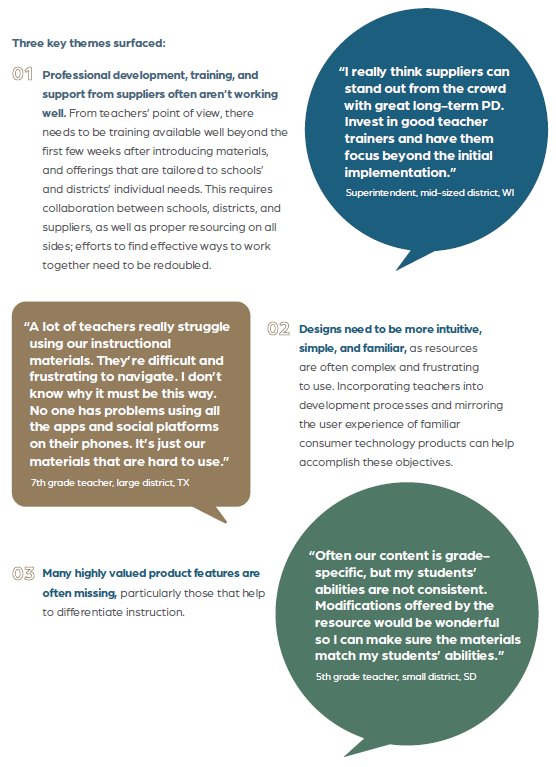What We’re Thinking About in Impact for 2026
January 21, 2026 BlogThe education sector is navigating a fundamental shift. Market forces are driving consolidation, capital is more selective, and…
As the first year of “back-to-school” learning draws to a close, we want to take the opportunity to highlight some of the work our team’s been focused on in K-12. One of the aspects we love about this job is serving as a conduit for parents, educators, businesses and thought leaders, bringing their perspectives to bear in ways that can benefit us all. It is in this spirit that we share two resources, each of which grapples with an important K-12 topic through a different lens:
First, we invite you to stream our ASU+GSV panel on social emotional learning, moderated by Tyton Partners Senior Advisor Andrea Mainelli, which touches on the tension simmering around the philosophy and practice of SEL – and what we can do about it.
Next, we are thrilled to announce the publication of Improving Instructional Resources to Enhance the Teacher Experience, a new study conducted in partnership with the Walton Family Foundation that centers the needs of teachers in answering the question how can we improve the quality of instructional materials? Read below for a summary of findings and download the full report.
As parents and educators will tell you, we still have much to learn about the continuing effects of the pandemic on our students. May is Mental Health Awareness Month, and now more than ever it is incumbent on us to draw attention to what matters most – the social well-being and mental health of our students. Troubling reports about the teen mental health crisis are hitting the press nearly weekly, with the latest headline reiterating what we already know – the pre-pandemic emerging crisis is now a full blow health epidemic of its own, and there are no systemic solutions to solve it.
Healthy social-emotional development – experienced at home, in school and in community settings – may be a precursor to heading off mental health problems, and educators and students who experience social emotional learning are better equipped to handle stress and trauma. Tyton Partners’ Finding Your Place: Social Emotional Learning Take Center Stage in K-12, provided a market-oriented view of this emerging sector, surveying educators and suppliers to understand attitudes around adoption and implementation pre- and post-COVID.
Much has happened since the report was issued in October 2021, and we explored what’s happening on the ground – as well as the increasing politicization of SEL – in a recent panel at ASU+GSV moderated by Andrea Mainelli, a Senior Advisor at Tyton Partners.
Critical themes emerged, articulated by panel experts, highlighting a central drama that increasingly focuses on everything except student well-being. While there is broad acceptance of the positive effects SEL has on students, murky vocabulary and misinformation has morphed it into a political hot potato that will very likely be a focus in this year’s midterms, with some states already curtailing curriculum and/or a focus on SEL. With 36 governorships changing and 469 congressional seats up for election, things could get even worse – a detriment to students and educators.
As the future of SEL hangs in the balance, we encourage you to visit the webinar and reconnect with some of the ways teachers are utilizing the practice to benefit students on the ground.
There is a crisis in U.S. schools: Teachers, the most important ingredient in a child’s learning,1 are demoralized. Even before the COVID-19 pandemic, one in six K-12 teachers reported that they were likely to leave the profession. During the pandemic, this number increased to one in four.2
While many factors impact teachers’ experience and success in the classroom, Tyton Partners recently conducted an in-depth analysis focusing specifically on the use and importance of one key ingredient: instructional resources. Having access to easy-to-use, high-quality resources is vital. However, until now, limited public research has been completed on the teacher experience with these resources and how to improve it.
What Tyton Partners discovered was significant. From teachers’ point of view, even some of the most lauded materials can be difficult to use and don’t always address key pain points for teachers. Furthermore, educators rarely receive the robust training and support needed to effectively use the materials and understand the richness of what the tools offer. Therefore, teachers often ignore materials that don’t deliver and instead find workarounds or buy alternatives – sometimes with their own funds.
However, there is good news. Tyton Partners’ analysis revealed that teachers who have standards-aligned materials that they find useful – and sufficient support to use those materials – have higher job satisfaction. We also identified a series of actionable steps that can enhance instructional resources and drive their adoption and effective use by educators. Contributing to the widespread effort to improve the classroom experience and our education system, our aspiration is that developers and suppliers of materials can use what we have discovered to make their products and services even more appealing and useful for teachers.

This report offers more detail on each of these themes, derived from a rigorous analysis of teachers’ responsibilities; qualitative interviews with more than 50 teachers, administrators, suppliers, and other stakeholders; and quantitative surveys of 1,600 K-12 teachers and 700 school and district leaders.